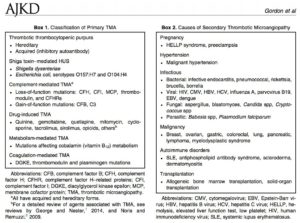Earlier this year the website featured an article ( click here )about the nomenclature used to described aHUS. Clinical articles now feature many terms to describe differences in what was for many years just known as TTP .
Firstly TMA was separated from TTP to cover illnesses other than TTP which had TMA as a key feature. Then HUS was separated from TTP to describe some further TMAs that were not due to TTP.
Von Gasser’s HUS was a plural term because he thought there was more than one cause of HUS. HUS caused by e.coli took over the main term; and began to regarded as”typical” HUS( but it was not called typical) and all other causes of HUS were described as atypical i.e. not caused by e.coli.
In the years that have followed the spectrum of aHUS began to be broken down into finer elements and a distinction made between aHUS caused by dysregulation in the Complement System and aHUS that was not. Creating a Primary aHUS and a Secondary aHUS classification, each with its own spectrum.
Meanwhile TTP and TMA were going through their own recategorisations as more differences were discovered between patients. The latter has,like aHUS, even developed Primary and Secondary categories.
In a recently published article in American Journal of Kidney Disease by Gordon et al, two tables were presented which bring together, and illustrates, the multi facets of TMA and aHUS and their Primary and Secondary classifications.

In the table, the term aHUS does not feature at all, instead what we know as Primary aHUS is called Complement-mediated TMA and is just one of four former “aHUSs” renamed as TMAs ; and which along with TTP and HUS make up the Primary TMA group.
A second table classifies Secondary TMAs and inludes those triggered during pregnancy , organ transplants , infections , auto immune disorders, cancer and hypertension.
aHUS patient support groups around the world are a fairly recent development, and, their natural inclination is towards renal patient advocacy because of what its TMA does to the kidney.
Even in that environment there is very little interface with other renal TMAs like HUS patient groups. Less so with TTP patient groups and hardly any at all with the patient groups advocating for those patients affected by other Secondary TMAs. Yet, as the saying goes ,”there is much more that unites us than divides us ” in particular , our common objective of getting an accurate diagnosis and quickly.
For all of us having medics identifying our TMA is important and crucial.
aHUS is a very rare disease, and the majority of medics will probably not encounter a case of aHUS in their whole career and may not know about the disease. Although it is frightening to know that a diagnosis may be missed as a result, it is unrealistic to assume that all doctors could know about the disease.
TMAs are rare too, but it may be less unrealistic to expect doctors to know about them. TMAs should have a similar clinical status as being able to recognise a suspected heart attack.
Working out the particular cause of the TMA is another matter,as the tables show ,and require specialists working as a team to arrive at the answer.
The AJKD paper about TMAs is but one element of a movement to improve diagnosis for all affected by TMA, In doing so it improves the diagnosis of aHUS “mediated TMAs”.
Raising awareness of aHUS underpins all aHUS patient advocacy aims, but getting TMA awareness can transcend many patient advocacy groups as can be seen.
The current alliance collaboration on a symposium in Boston about TMA( as seen through the lens of aHUS) , demonstrates aHUS patient advocacy’s willingness to go beyond it own boundaries for those affected by TMAs worldwide; and which in its own way could do a bit to help to break down diagnostic barriers- which is a key alliance aspiration.
The symposium will be recorded and will be one part of the aHUS Awareness Day communications this year.
Much time and effort has been invested to create an aHUS Awareness Day; and for now, Complement-Mediated TMA Awareness Day does not have same appeal.
Perhaps one day there might be a TMA Awareness Day though!

